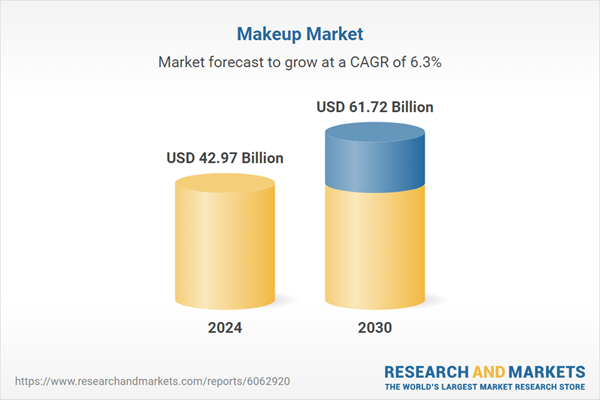Speak directly to the analyst to clarify any post sales queries you may have.
10% Free customizationThis report comes with 10% free customization, enabling you to add data that meets your specific business needs.
Trends such as premiumization, celebrity brand endorsements, and influencer collaborations are reshaping consumer behavior and brand positioning.
Key Market Drivers
Increasing Beauty Awareness and the Role of Social Media
A major driver of market expansion is the growing emphasis on beauty and self-care across diverse consumer segments. Social media platforms such as Instagram, TikTok, and YouTube have transformed how beauty trends are introduced and disseminated globally. Influencers, content creators, and celebrity endorsements significantly shape consumer preferences, often spurring viral demand for trending products.The widespread availability of beauty tutorials, product reviews, and user-generated content empowers consumers to explore and adopt new products and techniques with ease. According to recent data, 68% of consumers actively seek skincare and cosmetic products with clean, non-toxic ingredients, and 41% cite social media as a key influence in their purchase decisions.
Additionally, makeup is increasingly viewed not only as a cosmetic tool but also as a form of self-expression and a means to boost confidence and mental well-being. Gen Z and millennial consumers, in particular, are drawn to innovative, high-quality products that align with their personal values and aesthetic preferences. As a result, brands are frequently launching limited-edition collections, trend-based product lines, and influencer collaborations to stay relevant and drive customer engagement.
Key Market Challenges
Intensifying Competition and Market Saturation
The makeup industry is experiencing heightened competition, with a proliferation of both legacy brands and emerging players competing for market share. The growth of indie and direct-to-consumer (DTC) beauty brands has disrupted traditional business models, compelling established players to innovate and differentiate.Digital platforms and e-commerce have lowered barriers to entry, enabling smaller brands to penetrate niche markets with targeted marketing and influencer partnerships. However, the abundance of options has led to reduced brand loyalty, with consumers frequently switching between brands based on new trends, social endorsements, and product innovations.
The fast-paced nature of beauty trends, largely driven by social media algorithms and short-form content platforms like TikTok, puts pressure on brands to continually introduce new offerings. This constant demand for innovation can stretch R&D budgets and challenge product development timelines.
To remain competitive, brands must focus on unique value propositions, robust brand storytelling, and personalized customer experiences that go beyond traditional marketing.
Key Market Trends
Adoption of Digital and AI-Powered Beauty Technologies
Technological innovation is playing a transformative role in reshaping the consumer makeup experience. The integration of artificial intelligence (AI), augmented reality (AR), and digital beauty tools is revolutionizing how customers discover, test, and purchase makeup products.AR-enabled virtual try-on solutions allow users to experiment with different makeup looks via smartphones or online platforms, reducing hesitation and increasing purchase confidence. At the same time, AI-powered apps can analyze individual skin tones, textures, and preferences to recommend tailored product options, significantly improving customer satisfaction.
Leading beauty brands are increasingly investing in smart shade matching technologies, helping customers find ideal foundation or lipstick shades that align with their unique features. These advancements are not only enhancing convenience but also supporting inclusivity and personalization in the shopping journey.
As digital transformation continues to reshape the beauty landscape, companies that embrace innovation and data-driven personalization are likely to gain a competitive edge.
Key Market Players
- L'Oréal S.A.
- Unilever plc
- Avon Products, Inc.
- Revlon Consumer Products LLC
- Coty Inc.
- The Procter & Gamble Company
- Kao Corporation
- Shiseido Co., Ltd.
- Benefit Cosmetics LLC
- The Estée Lauder Companies Inc.
Report Scope:
In this report, the Global Makeup Market has been segmented into the following categories, in addition to the industry trends which have also been detailed below:Makeup Market, By Product:
- Powders
- Gels
- Lotions
- Others
Makeup Market, By Application Area:
- Lips
- Eyes
- Face
- Nails
Makeup Market, By Sales Channel:
- Hypermarket/Supermarket
- Specialty Store
- Online
- Others
Makeup Market, By Region:
- North America
- United States
- Canada
- Mexico
- Europe
- France
- United Kingdom
- Italy
- Germany
- Spain
- Asia-Pacific
- China
- Japan
- India
- South Korea
- Indonesia
- South America
- Argentina
- Colombia
- Brazil
- Middle East & Africa
- South Africa
- Saudi Arabia
- UAE
- Turkey
Competitive Landscape
Company Profiles: Detailed analysis of the major companies present in the Global Makeup Market.Available Customizations:
With the given market data, the publisher offers customizations according to a company's specific needs. The following customization options are available for the report.Company Information
- Detailed analysis and profiling of additional market players (up to five).
This product will be delivered within 1-3 business days.
Table of Contents
Companies Mentioned
- L'Oréal S.A.
- Unilever plc
- Avon Products, Inc.
- Revlon Consumer Products LLC
- Coty Inc.
- The Procter & Gamble Company
- Kao Corporation
- Shiseido Co., Ltd.
- Benefit Cosmetics LLC
- The Estée Lauder Companies Inc.
Table Information
| Report Attribute | Details |
|---|---|
| No. of Pages | 181 |
| Published | April 2025 |
| Forecast Period | 2024 - 2030 |
| Estimated Market Value ( USD | $ 42.97 Billion |
| Forecasted Market Value ( USD | $ 61.72 Billion |
| Compound Annual Growth Rate | 6.2% |
| Regions Covered | Global |
| No. of Companies Mentioned | 10 |









